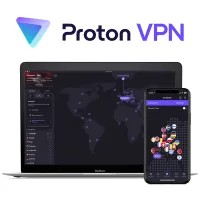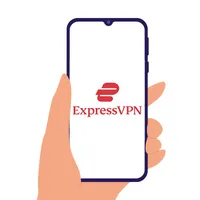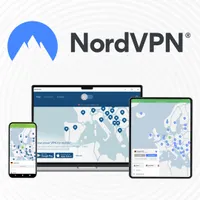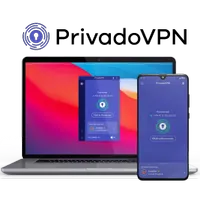The fastest VPNs for outright speed: we tested WireGuard, OpenVPN, and more to find the fastest providers right now
If you're not first, you're last
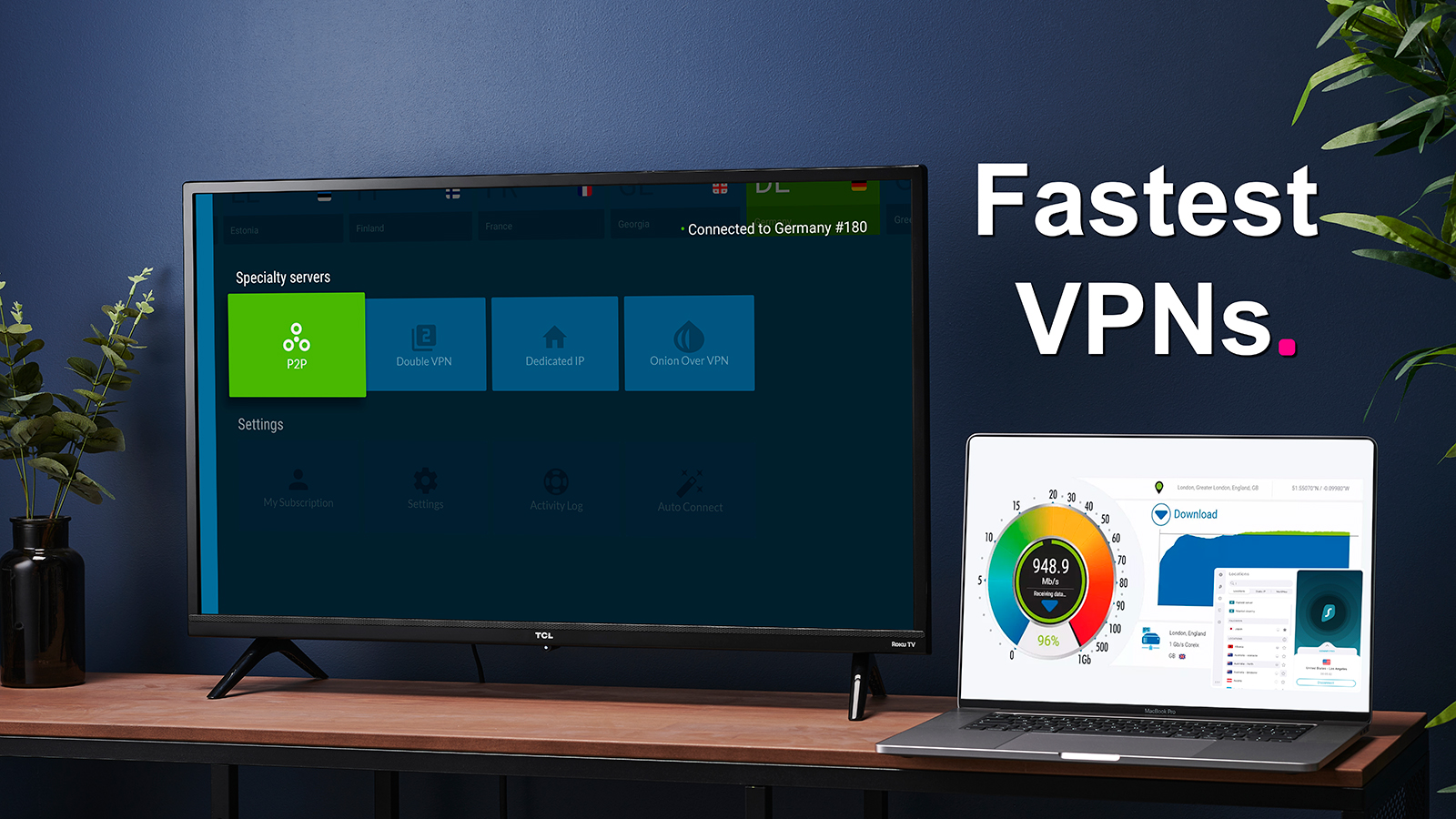
Sign up for breaking news, reviews, opinion, top tech deals, and more.
You are now subscribed
Your newsletter sign-up was successful
Today's fastest VPNs protect your online privacy without massively impacting your connection speeds, so you won't have to deal with long page load times and stuttering streaming content.
While the best VPNs encrypt the traffic that leaves your device, making it unreadable to third-party snoopers, the extra steps this adds to the connection process could negatively impact your overall speeds. The VPNs we've included in this guide are all more than quick enough to keep up with demanding online activities – think streaming in HD and 4K, gaming, and torrenting.
Surfshark is the best choice overall. The speeds we recorded maxed out our testing connection, ensuring that our streaming sessions weren't interrupted by any buffering issues or choppy audio. NordVPN is a close second, with comparable speeds that stayed consistent even when we connected to servers on the other side of the world.
The three fastest VPNs at a glance
1. Surfshark
The best cheap VPN (and also the fastest)
Surfshark's WireGuard speeds clocked in at over 1600+ Mbps, making it more than capable of uninterrupted HD and 4K streaming. Connecting to a US server from the UK was just as quick, which is good news for anyone who travels frequently and relies on distant servers to enjoy content back home – without worrying about low-quality streaming content and long page load times. Surfshark is a budget-friendly choice, too, and all subscription tiers are covered by a 30-day money-back guarantee or 7-day free trial.
2. Proton VPN
The best VPN for privacy
Proton VPN, like Surfshark and NordVPN, recorded WireGuard speeds of 1500+ Mbps when we put it to the test. As a result, we didn't encounter any issues with low-quality streaming pictures or choppy audio in video calls. Proton's cross-Atlantic speeds have seen a huge improvement, too, at 1200+ Mbps, more than quick enough to spoof your location across the globe without tanking your performance. Try Proton VPN in your own time with its 30-day money-back guarantee.
3. ExpressVPN
Simple and speedy
ExpressVPN's Lightway Turbo protocol is more than a match for any VPN in a speed test. It recorded over 1450 Mbps throughout our testing. Connecting to the US was similarly effective, achieving over 1350 Mbps. It also recorded <15 ms latency throughout, perfect if you're looking for a smooth gaming experience. ExpressVPN recently dropped its prices, and, with a 30-day money back guarantee, you can get these huge speeds for less than even the best VPN, NordVPN.
4. NordVPN
The best VPN overall
NordVPN's fastest protocol, NordLynx, is just as quick as Surfshark, coming in at 1250+ Mbps during our hands-on testing. This is more than fast enough to keep up with streaming, torrenting, and video calls – all without a single lag stutter. NordVPN's sub-20 ms latency makes it an especially reliable choice for online gaming, especially if you want to avoid delayed actions and rubber-banding. See how NordVPN compares to Surfshark with its risk-free 30-day money-back guarantee.
5. PrivadoVPN Free
The best free VPN
While most free VPNs struggle to keep up with HD and 4K streaming – or even day-to-day browsing – PrivadoVPN Free also recorded speeds of 1000+ Mbps, and we didn't encounter any slow-loading pages or choppy audio in voice calls during our testing. PrivadoVPN Free can also access a handful of streaming platforms – including Netflix US and UK. However, free users are limited to 10 GB a month, then speeds are throttled to around 5 Mbps. PrivadoVPN Free is, indeed, free to use, though a premium alternative, PrivadoVPN, is also available.
The fastest VPN services in 2026
Why you can trust TechRadar
The fastest VPN overall
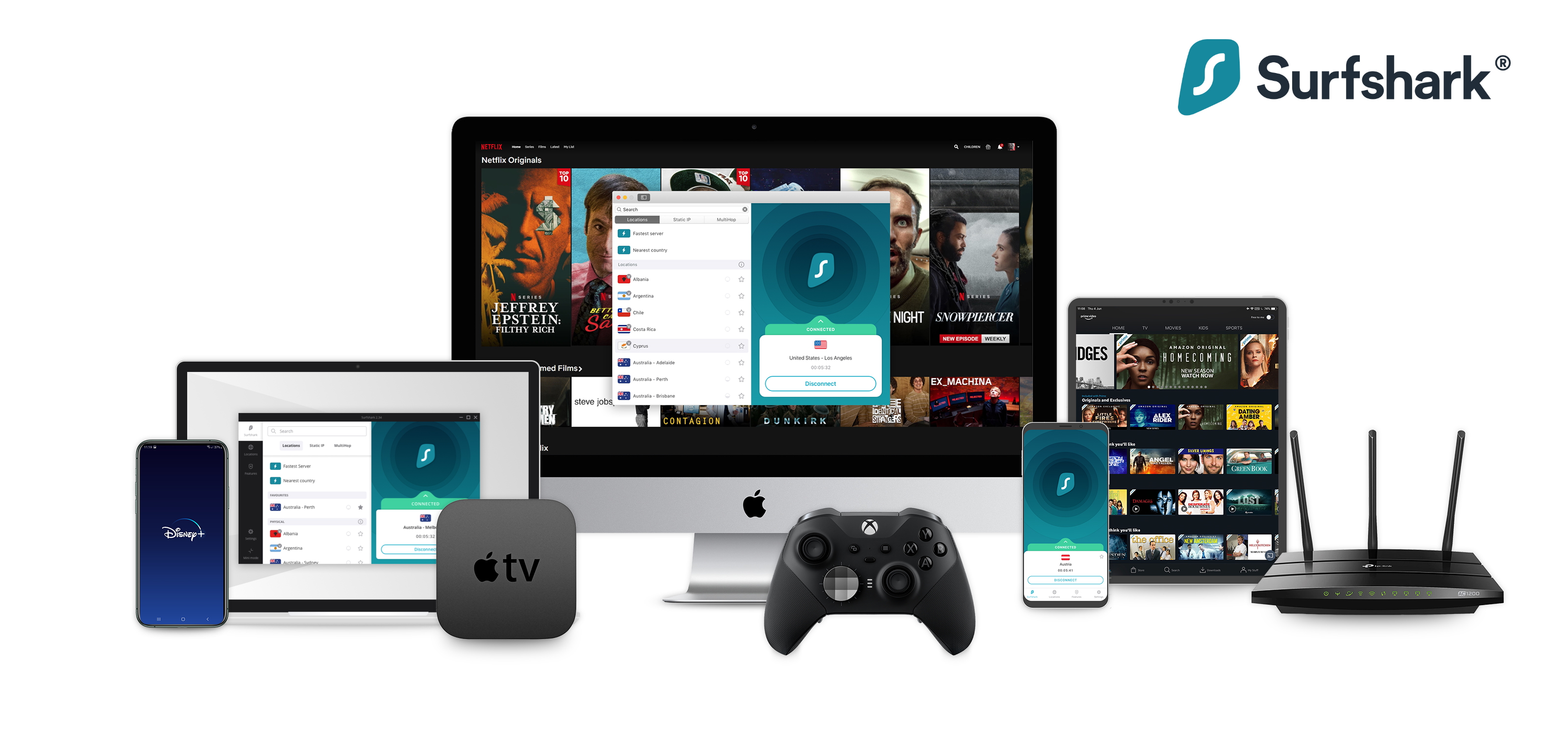
1. Surfshark
Today's fastest VPN – and the best budget-friendly prices
Surfshark’s fastest protocol, WireGuard, recorded speeds of 1615 Mbps during our most recent round of in-house testing (where we connected to a nearby UK-based server via a 10 GB line). This performance comes as a huge improvement from its previous score, likely due to our improved testing parameters, but cements Surfshark's place as the fastest VPN of them all.
We tested Surfshark’s latency, too, which came in at 21.7 ms – almost good enough to be in the sub-20 ms golden zone that’s ideal for lag-free online gaming. Surfshark’s jitter (or lack thereof) was equally impressive. High jitter occurs when there's a delay in how long it takes for a data packet to travel across a network, and this can cause disruptions to streaming content, gaming, and video calls. So Surfshark's result of 2.3 ms meant that our streaming sessions didn’t encounter any issues with choppy audio or stuttering picture quality, and it's a huge 2ms drop from our last round of testing.
Read more about Surfshark ▼
Most VPNs struggle to maintain peak speeds when connecting to long-distance servers; unfortunately, in our latest tests, Surfshark was no different.
Having recorded over 950 Mbps in our last round of testing, Surfshark only achieved 355 Mbps when connecting to the US from the UK this time around. While this is a huge drop, it remains more than fast enough to ensure you can stream smoothly while abroad across several devices.
Thankfully, we have seen a huge rise in Surfshark’s OpenVPN performance. It previously clocked in at only 460 Mbps, our most recent data now puts OpenVPN at 978 Mbps, the second-fastest speeds on OpenVPN we recorded behind ExpressVPN's 1038 Mbps.
In terms of streaming, Surfshark is one of the best Netflix VPNs available today. We found that content loaded quickly, in crisp high definition, aside from the handful of nighttime hiccups we mentioned earlier. Plus, Surfshark can unblock all popular platforms: Netflix, Prime Video, Disney+, and BBC iPlayer included.
The best VPN for privacy
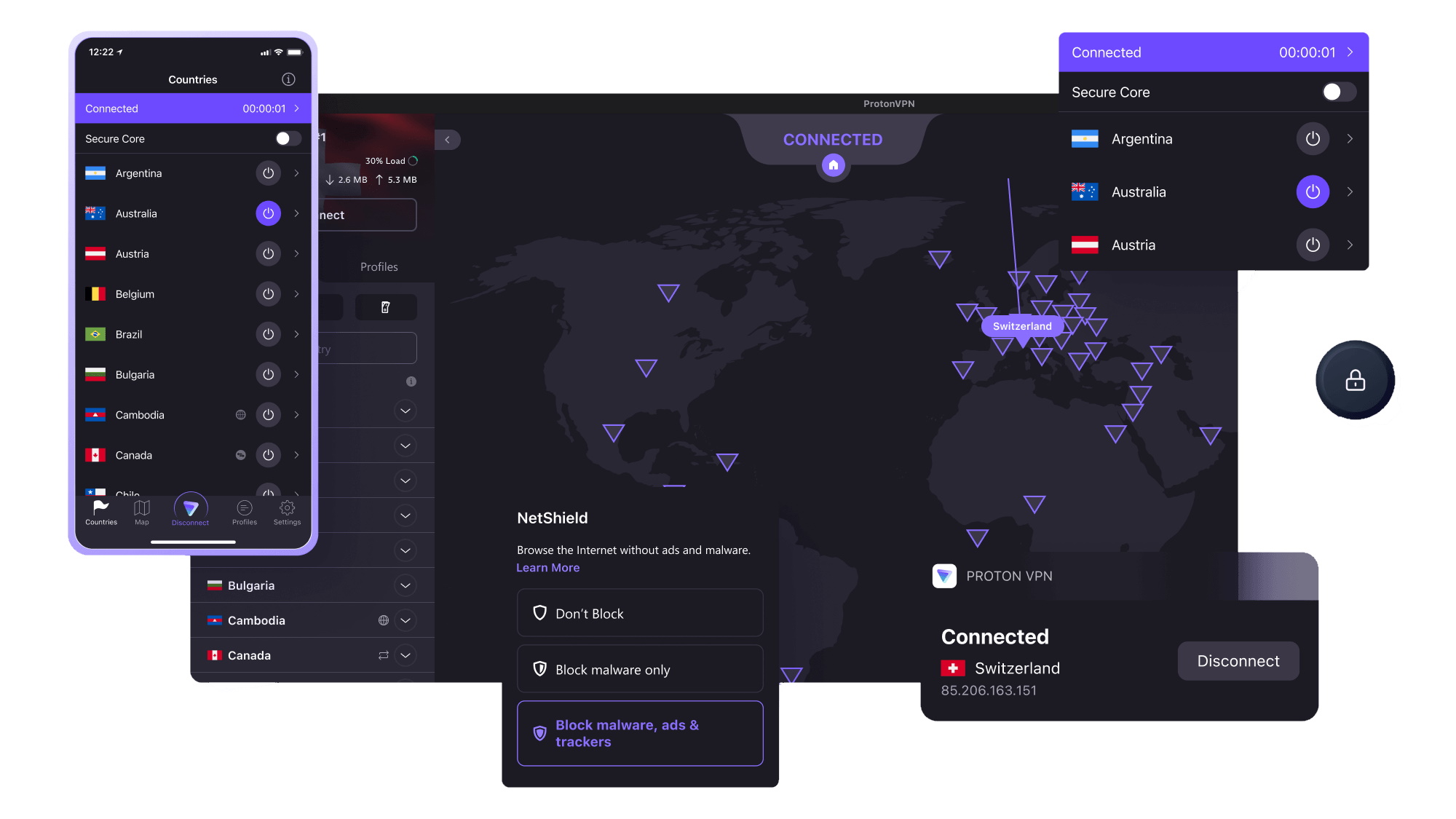
2. Proton VPN
A VPN that continues to advocate for internet freedom everywhere
Proton VPN jumps to second place in our rankings thanks to some huge improvements in our latest tests. We recorded WireGuard speeds of 1512 Mbps using our 10 GB connection via a UK server. When we last put Proton VPN’s WireGuard speeds to the test, they clocked in at around the 1000 Mbps mark, though this is likely more a limitation of our testing capabilities at the time than of Proton's performance.
The latency and jitter we saw were also among the best recorded results. Latency came in at 14.2 ms, down from 19.6, which is ideal for hopping into online games and video calls. Jitter of 5.2 ms is slightly higher than last time, but still better than the likes of PIA or ExpressVPN, which is no doubt why we didn’t encounter any trouble with freezing or choppy playback when streaming.
Read more about Proton VPN ▼
Proton VPN previously fell short in its long-distance speed results. When we connected to a US server from our base in the UK, its WireGuard performance was only 630 Mbps. Now, however, it's recorded 1242 Mbps speeds when connecting over the Atlantic, the second-fastest speeds we saw for this test, behind only ExpressVPN's Lightway Turbo.
This means that if you’re looking for a super-fast VPN for travel (let's say you're headed to the US on vacation and leaving the UK behind, but still want to follow live Premier League matches the same way you would at home), you'll scarcely find a VPN that is better equipped to handle it.
Proton VPN’s OpenVPN speeds have also improved. We recorded a performance of 240 Mbps, up from the 220 Mbps recorded previously, but this is still lagging behind every other top provider. If you need to switch to OpenVPN and benefit from its battle-tested security, you'd be better off looking towards ExpressVPN, Surfshark, or NordVPN.
We also put Proton VPN’s proprietary Stealth protocol to the test, seeing speeds of 403 Mbps, surprisingly quicker than even its OpenVPN results. While slower than WireGuard, this is the range we expected to see for a privacy-focused protocol – and Stealth is designed to conceal your VPN traffic and evade VPN bans in privacy-unfriendly countries, and not necessarily for streaming HD and 4K content.
Luckily, switching to WireGuard with Proton VPN turns it into a great streaming VPN able to access all of the streaming platforms we threw at it. Content loaded as quickly as it does without a VPN, and we didn’t need to disconnect and reconnect to resolve any stuttering issues.
The fastest beginner VPN

3. CyberGhost
The fastest beginner VPN
ExpressVPN has entered the picture as one of the fastest VPNs available in our latest round of testing. Previously, its speeds had reached around 898 Mbps, now Lightway Turbo, ExpressVPN's proprietary protocol for Windows, has recorded 1479 Mbps speeds, the third-fastest of every VPN we've tested.
It's also recorded some strong latency and jitter results. 14.8 ms latency puts Lightway Turbo third behind Proton VPN and, strangely, ExpressVPN's standard WireGuard protocol. 5.3 ms jitter isn't the strongest by any stretch, but it's low enough that you should rarely encounter any issues, and it remains a better result than those achieved by PIA.
Read more about ExpressVPN ▼
Lightway Turbo was also mega-quick when connecting from the UK to the US. It achieved 1374 Mbps, the fastest speeds of any provider we put through this test. Plus, its latency (75ms) and jitter (5.7ms) were among the strongest results over the longer distance. This is great if you're travelling and looking to retain access to your favorite streaming services from home without experiencing awful picture quality.
Looking elsewhere, ExpressVPN also topped our OpenVPN speed charts. It reached 1038 Mbps, 40 Mbps faster than its nearest competitor, Surfshark. It also recorded only 15.5 ms latency and 6.8 ms jitter, which, while slower than you might like, is still a respectable measure given the security benefits and increased code used by OpenVPN.
Where ExpressVPN did fall short, however, was across its WireGuard and non-Turbo Lightway protocols. These achieved 694 Mbps and 489 Mbps at most during our testing, far below most VPNs, with only PIA's 621 Mbps coming close. Strangely, the WireGuard protocol performed superbly across latency (13.6 ms) and jitter (2.4ms).
These results put it first in latency and second only to Surfshark for jitter. Given that nearly 700 Mbps is more than enough for any gaming session or binge-watch, it could be worthwhile considering WireGuard instead of Lightway Turbo if you're after the smoothest experience possible.
The speeds, understandably, didn't improve when connecting to the US either. WireGuard achieved only 523 Mbps, while Lightway achieved only 323 Mbps. Either of these results are more than enough if you're looking to stream while on the go, but if you're looking for the best way possible, you're better off looking towards either Lightway Turbo or Proton VPN.
The best VPN with antivirus
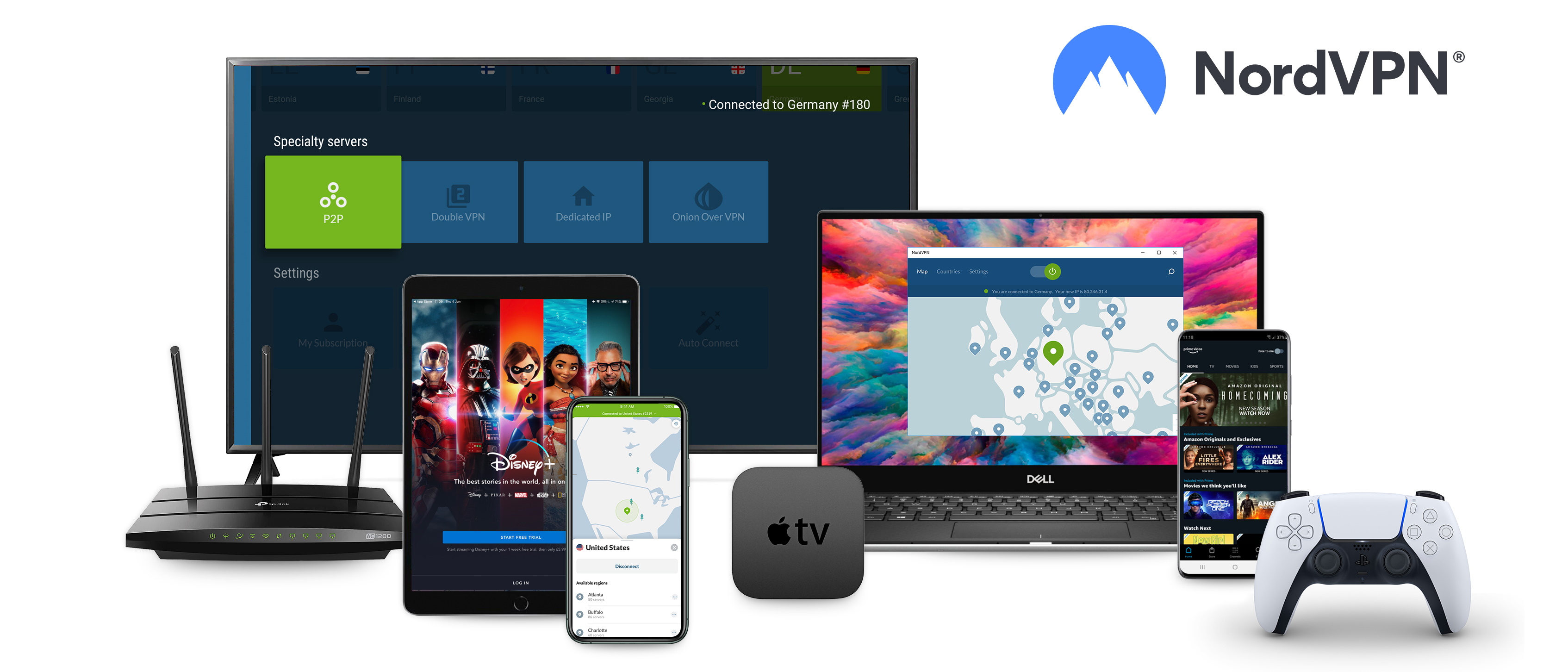

4. NordVPN
A solid all-rounder with speeds that really deliver
NordVPN, despite dropping a few spaces in our list, remains among the fastest VPNs. Thanks to our new 10 Gbps testing line, we were able to record speeds of 1256 Mbps using NordLynx, NordVPN's proprietary, WireGuard-based protocol. While this is a noticeable jump from our last tests, it puts the provider behind Surfshark, Proton VPN, and ExpressVPN for the time being.
High latency can impact online gaming sessions, and anything below 20 ms is considered ideal, especially if you play competitive multiplayer titles. NordVPN recorded a latency of 17.2 ms, an improvement of around 2ms and below this threshold, underscoring its position as the best gaming VPN on the market.
Similarly, we saw jitter of just 2.4 ms, which won’t cause any rubber-banding (which happens when you're moving in one direction only to be suddenly snapped back to a previous location) or input delay while gaming, or audio and playback issues while streaming.
Read more about NordVPN ▼
Unfortunately, our latest round of testing saw a huge performance drop when connecting to a US server from the UK. NordVPN only achieved 626 Mbps using NordLynx this time round, having previously recorded over 950 Mbps. This puts NordVPN below the majority of VPN providers in this area, including PrivadoVPN's free plan. For the best cross-Atlantic connection, check out Proton VPN or ExpressVPN.
NordVPN’s OpenVPN speeds have seen huge improvements since the last time we tested them, jumping from 173 Mbps to 974 Mbps. This doesn’t rival its NordLynx performance, but OpenVPN scores rarely do (the protocol isn’t as lightweight). We were also pleased to see great improvements to its latency and jitter. The provider scored the best of any OpenVPN protocol we tested, achieving 14.6ms latency and 4.2ms jitter.
The same is true for streaming, and when we used the protocol to tune in to Netflix, Prime Video, BBC iPlayer, and more, we didn’t encounter a single issue with buffering or stuttering picture quality. Plus, content loads first time, every time - even when switching to the OpenVPN protocol.
A great free alternative
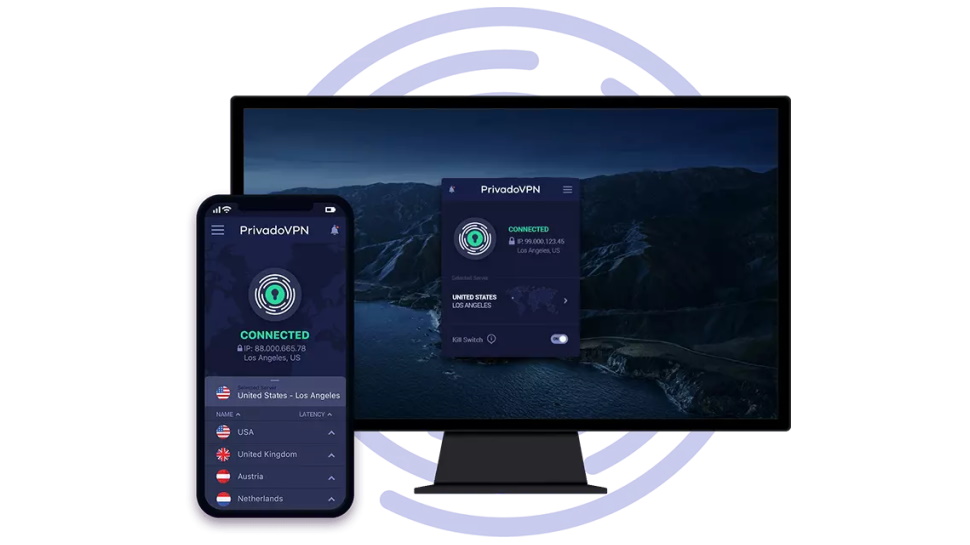
5. PrivadoVPN Free
A free VPN with a surprisngly speedy WireGuard performance
In addition to being the best free VPN, PrivadoVPN Free recorded unexpectedly quick speeds using the WireGuard protocol - clocking in at 1045 Mbps. Some paid providers struggle to match this performance, so PrivadoVPN Free’s presence at the tail end of our rankings is a surprise, but well-earned, and gives users looking for a quick free service a viable option to trial.
It also performed admirably when connecting to the US from the UK. It achieved 900 Mbps, faster than NordVPN, PIA, and several of ExpressVPN's protocols. This means you should never have any trouble connecting to home services such as banking or streaming services when you're travelling, no matter the distance away from home that you are.
Read more about PrivadoVPN Free ▼
As is the case with any free VPN, however, PrivadoVPN has its limitations, with the biggest being a monthly limit of 10 GB. However, unlike other free services (like Windscribe Free), PrivadoVPN Free won’t cut you off entirely if you reach this cap, and you’ll instead be allowed to continue using the service - albeit with speeds throttled to around 2 - 4 Mbps. Unfortunately, this is way less than the minimum 25 Mbps you’ll need to enjoy 4K content on Netflix, and barely enough for HD, which takes 2 - 5 Mbps..
Still, while you’re within your data allowance, its WireGuard speeds easily keep up with streaming and live content, video calls, and even torrenting. PrivadoVPN Free is also one of a handful of free VPNs that can actually unblock popular streaming services.
We were able to tune into the US and UK Netflix libraries, Disney+, and BBC iPlayer. You’ll get more streaming support from the premium alternatives in this guide, however, particularly Surfshark and NordVPN, which unblocked the libraries PrivadoVPN Free couldn’t - including multiple Netflix libraries outside the States and Britain, Prime Video, and Australia’s 9Now and 10Play.
TechRadar's VPN speed rankings
Want to know the raw speeds that we discovered in our testing? Check out the table below where each provider is listed according to its US speed. You'll find some of our top performers, consistently quick providers, and a few newcomers who have shot through the ranks.
Remember, the table is based solely on speed, which is why curate providers that combine maximum performance, consistent speeds across regions and protocols, and other qualities in our countdown above.
VPN Provider | WireGuard or proprietary | OpenVPN |
|---|---|---|
1. Surfshark | 1615 Mbps | 978 Mbps |
2. Proton VPN | 1521 Mbps | 240 Mbps |
3. ExpressVPN | 1479 Mbps | 1038 Mbps |
4. NordVPN | 1256 Mbps | 974 Mbps |
5. PrivadoVPN Free | 1045 Mbps | - |
4. CyberGhost | over 950 Mbps (maxed out our testing) | 165 Mbps |
7. PrivadoVPN | 550 Mbps | 806 Mbps |
8. Windscribe | 785 Mbps | 365 Mbps |
9. Windscribe Free | 509 Mbps | - |
10. PIA | 436 Mbps | 257 Mbps |
How we test VPN services - our review methodology
The TechRadar team retests the industry’s top VPNs every six months – and calculating the speed of these providers is often the most time-consuming part of the process. It’s an important consideration, however, as a slow VPN that can’t keep up with streaming, gaming, torrenting, or even day-to-day browsing just isn’t worth using.
We ensure that VPNs are tested across an even playing field by using a Windows set-up and a 10 Gbps Ethernet-based connection. We combine at least three speed testing sites, test our normal connection speed with the VPNs switched off, and then, one by one, we enable the VPNs and record their performance. We repeat these tests at least five times throughout the day and take the median average as our result.
In terms of protocols, we test OpenVPN wherever it is available, along with WireGuard, or any proprietary protocol based on it. Think ExpressVPN’s Lightway or NordVPN’s NordLynx.
We’re aware that speeds can fluctuate based on the distance between our home base and the server location, too. So, while we test the speeds of the closest UK-based server, we’ll also record the performance of a VPN when connected to a US-based alternative to record the fairest representation of the provider’s performance.
You can read more about our full VPN testing methodology here.
Fastest VPN FAQs
Which VPN is fastest?
Surfshark is the fastest VPN with WireGuard speeds of 1615 Mbps. This far exceeds the 5 - 25 Mbps you need to enjoy smooth HD and 4K streaming content without worrying about buffering hiccups or a sluggish day-to-day browsing experience.

Do VPNs make your internet slower?
VPN encryption renders your data unreadable to snoopers, but this does add extra steps to the process of connecting to the web, which can impact your overall speed. However, today’s best VPNs invest heavily in their infrastructure to ensure that this impact is as negligible as possible, and that you’ll barely notice that you’re connected to a VPN in the first place.
We test and review VPN services in the context of legal recreational uses. For example: 1. Accessing a service from another country (subject to the terms and conditions of that service). 2. Protecting your online security and strengthening your online privacy when abroad. We do not support or condone the illegal or malicious use of VPN services. Consuming pirated content that is paid-for is neither endorsed nor approved by Future Publishing.
Sign up for breaking news, reviews, opinion, top tech deals, and more.

Rob is TechRadar's VPN Editor. Coming from a background in phones and technology, he's no stranger to the risks that come with putting yourself online. Over years of using different platforms, testing the limits of his online persona, and feeling the brunt of several data breaches, Rob has gained a keen understanding of cybersecurity and the benefits of services such as VPNs in providing a secure online experience. He uses this to not only advise on the best ways to stay secure online but also share his own experiences and especially how to avoid trouble. Outside of work, you'll find Rob on the tennis courts, in the gym, or diving into the biggest and best games of the year.
To share a story or tip, email robert.dunne@futurenet.com
- River HartTech Software Editor

